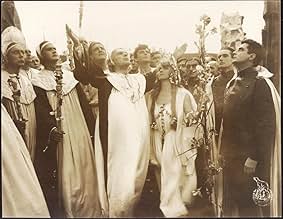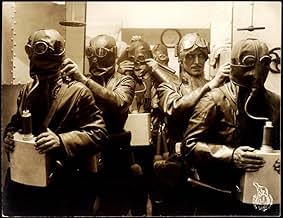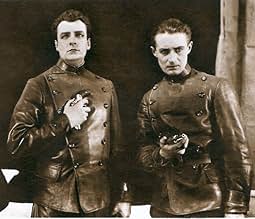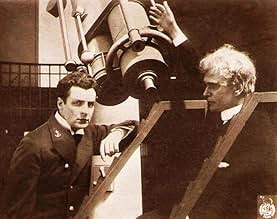Adicionar um enredo no seu idiomaA group of researchers from Earth travel in a spaceship to Mars, where, to big surprise, they find a peaceful vegetarian and pacifist civilization.A group of researchers from Earth travel in a spaceship to Mars, where, to big surprise, they find a peaceful vegetarian and pacifist civilization.A group of researchers from Earth travel in a spaceship to Mars, where, to big surprise, they find a peaceful vegetarian and pacifist civilization.
- Direção
- Roteiristas
- Artistas
Nils Asther
- Wounded Martian Citizen
- (não creditado)
Alfred Osmund
- Martian Priest
- (não creditado)
Avaliações em destaque
I know I've seen a fair portion of this film as part of a series on rare silent movies, which was shown on TV around 25 years ago. It was beautiful and fascinating, and I yearned to see more of it, although most published literature states that it is 'lost'.
As it is extremely unlikely that the film will ever see the light of day in its complete form, a spoiler warning is irrelevant, and the following is gleaned from published synopses more than from my personal recollection.
It is an early space opera, concerning a team of explorers who visit the planet Mars, and encounter a race of peace-loving vegetarians (is there any other kind? Oh, sit down, Adolph!). They return to Earth with the high priest's lovely daughter, and the plea for peace is threatened only by one villain who is dealt with by what can only be described as an Act of God.
Apart from George Melies' crazy moon explorer fantasies, this seems to be the first interplanetary adventure film in history, and from a country (Denmark) not noted for science-fiction films of any kind. Maybe they thought that they'd never do one better than this.
We might giggle at the idea that the spaceship had propellers on its wings, but come on...we are still accepting lots of logistically improbable and impossible concepts in films of today. I hope this film does still exist somewhere. The fragments I've seen, and the material I've read, makes me yearn to experience the whole of this 90-year-old space opera.
As it is extremely unlikely that the film will ever see the light of day in its complete form, a spoiler warning is irrelevant, and the following is gleaned from published synopses more than from my personal recollection.
It is an early space opera, concerning a team of explorers who visit the planet Mars, and encounter a race of peace-loving vegetarians (is there any other kind? Oh, sit down, Adolph!). They return to Earth with the high priest's lovely daughter, and the plea for peace is threatened only by one villain who is dealt with by what can only be described as an Act of God.
Apart from George Melies' crazy moon explorer fantasies, this seems to be the first interplanetary adventure film in history, and from a country (Denmark) not noted for science-fiction films of any kind. Maybe they thought that they'd never do one better than this.
We might giggle at the idea that the spaceship had propellers on its wings, but come on...we are still accepting lots of logistically improbable and impossible concepts in films of today. I hope this film does still exist somewhere. The fragments I've seen, and the material I've read, makes me yearn to experience the whole of this 90-year-old space opera.
Avanti Planeteros (Gunnar Tolnaes) is a soldier returned home after the war. His astronomer father (Nicolai Neiiendam) convinces him that the future is in the stars, so Avanti teams with Dr. Krafft (Alf Blutecher), who is betrothed to Avanti's sister Corona (Zanny Petersen), to build a spaceship capable of reaching Mars. They construct something that looks like a small, metal blimp with bi-plane wings, and along with a crew of about 8 other guys, they set off for Mars. Once there, they discover an idyllic paradise of robe-wearing, God-loving vegetarians. And of course a Martian woman (Lilly Jacobson) who immediately falls in love with Avanti. Also featuring Frederik Jacobsen as Professor Dubius.
This had to have been silly stuff even in 1918. After the end of WWI I'm sure that most Europeans were looking for a peaceful new way of life as far from war and misery as possible. The Martians aren't aliens as much as idealized humans, looking a bit like Ancient Greeks but with Egyptian ankhs on all of their clothing (Ancient Aliens?!?). The acting is hammy, the effects as primitive as one would imagine, and the story both juvenile and overlong. However, this is an important foundational step in the genre, which is why it's one of the 101 Sci-Fi Movies to See Before You Die.
This had to have been silly stuff even in 1918. After the end of WWI I'm sure that most Europeans were looking for a peaceful new way of life as far from war and misery as possible. The Martians aren't aliens as much as idealized humans, looking a bit like Ancient Greeks but with Egyptian ankhs on all of their clothing (Ancient Aliens?!?). The acting is hammy, the effects as primitive as one would imagine, and the story both juvenile and overlong. However, this is an important foundational step in the genre, which is why it's one of the 101 Sci-Fi Movies to See Before You Die.
I saw this film from 1918 recently at our local Helsinkian film archive. It seems that the Danish Film Institute has reconstructed it in 2006 to celebrate the 100th anniversary of Nordisk filmcompany, which was one of the largest in the world in the early 20th century. I believe there are several copies with English translations circulating around Europe at the moment.
I found the film fascinating and the trip to Mars well thought out. The plot line is certainly original, but I really don't want to reveal any more of it at the moment, as now the danger of spoiling things for you really exists ;-).
The film is also available on DVD, query the Danish Film Institute (Det Danske Filminstitut) web pages at dfi.dk with 'Himmelskibet' to get more info.
I found the film fascinating and the trip to Mars well thought out. The plot line is certainly original, but I really don't want to reveal any more of it at the moment, as now the danger of spoiling things for you really exists ;-).
The film is also available on DVD, query the Danish Film Institute (Det Danske Filminstitut) web pages at dfi.dk with 'Himmelskibet' to get more info.
I saw "Heaven-Ship" ("Himmelskibet") at the 2006 Cinema Muto festival in Sacile, Italy. What a great movie! This Danish steampunk saga is the stirring tale of the first trip to Mars, in an era when wireless telegraphy hasn't been perfected. The spaceship hasn't got a radio, and the heroes are brought back from the landing field via horsecart. Even the intertitles are delightful ... some of them written in rhymed couplets in the original Danish.
The actors' performances are laughable, largely hand-to-brow histrionics. But the sets are astonishing, easily surpassing anything done by Georges Melies a decade earlier (or in "Die Frau im Mond" a decade later). Of course, the plot is simplistic. The spaceship's crew consist of seven thin guys and one fat slob. Guess which one cracks. Interestingly, everyone in this movie (except the dubious Professor Dubius) ardently believes in God. Even the Martians.
Impressively, the scenarists have the sense to acknowledge that a trip to Mars is no doddle: the title cards establish that it takes the scientists two years to build their spaceship (which has an airscrew) and six months to reach Mars. During the construction sequence, there's one extremely impressive set-up which must have been choreographed: dozens of workers all hustle through the worksite in different directions, with no hesitations and no collisions. The Danish scientists christen their ship "Excelsior" ("packing materials"?) and set course for Mars, even though the Moon and Venus are closer. When the ship (which flies horizontally, not vertically) lands on Mars, it is greeted by "Marsboerne" -- Martians -- who turn out to be Nordic blondes, all highly-developed pacifists and vegetarians. (As a highly-developed meat-eater, I resented that part.)
Conveniently enough, Mars turns out to have an atmosphere just like Earth's, as well as equal gravity. In an exterior shot of the Martian landscape, the Sun's apparent magnitude when seen from Mars is the same as it is when viewed from Earth. I also couldn't help observing that all the wise elder Martians are male. In fact, female elders are thin on the ground here: both the Earth-born hero and the Martian maiden are motherless. The Martians speak a universal language, wear ankhs on their robes, and greet the Earth visitors with a globe of Earth ... which of course they hold with its North Pole upward.
That Martian maiden is Marya, played by an ethereally beautiful Danish actress. (Waiter, I'll have some of that Danish!) We see a Martian dance of chastity which might have been twee or ludicrous but is actually quite touching and beautiful. Also, the Martian funeral scene features one shot which reminded me of a sequence in "The Seventh Seal". I wonder if Ingmar Bergman saw this film.
"Himmelskibet" has a few flaws, but its production design and its other merits very far outweigh its drawbacks. The Ole Olsen who is named in the credits (and who appears in a brief prologue) is no relation to Chic Johnson's vaudeville partner from "Hellzapoppin". I would give "Himmelskibet" a 12, but the scale tops off at 10 ... so, a full 10 out of 10 for this delightful trip to Mars, the blonde planet!
The actors' performances are laughable, largely hand-to-brow histrionics. But the sets are astonishing, easily surpassing anything done by Georges Melies a decade earlier (or in "Die Frau im Mond" a decade later). Of course, the plot is simplistic. The spaceship's crew consist of seven thin guys and one fat slob. Guess which one cracks. Interestingly, everyone in this movie (except the dubious Professor Dubius) ardently believes in God. Even the Martians.
Impressively, the scenarists have the sense to acknowledge that a trip to Mars is no doddle: the title cards establish that it takes the scientists two years to build their spaceship (which has an airscrew) and six months to reach Mars. During the construction sequence, there's one extremely impressive set-up which must have been choreographed: dozens of workers all hustle through the worksite in different directions, with no hesitations and no collisions. The Danish scientists christen their ship "Excelsior" ("packing materials"?) and set course for Mars, even though the Moon and Venus are closer. When the ship (which flies horizontally, not vertically) lands on Mars, it is greeted by "Marsboerne" -- Martians -- who turn out to be Nordic blondes, all highly-developed pacifists and vegetarians. (As a highly-developed meat-eater, I resented that part.)
Conveniently enough, Mars turns out to have an atmosphere just like Earth's, as well as equal gravity. In an exterior shot of the Martian landscape, the Sun's apparent magnitude when seen from Mars is the same as it is when viewed from Earth. I also couldn't help observing that all the wise elder Martians are male. In fact, female elders are thin on the ground here: both the Earth-born hero and the Martian maiden are motherless. The Martians speak a universal language, wear ankhs on their robes, and greet the Earth visitors with a globe of Earth ... which of course they hold with its North Pole upward.
That Martian maiden is Marya, played by an ethereally beautiful Danish actress. (Waiter, I'll have some of that Danish!) We see a Martian dance of chastity which might have been twee or ludicrous but is actually quite touching and beautiful. Also, the Martian funeral scene features one shot which reminded me of a sequence in "The Seventh Seal". I wonder if Ingmar Bergman saw this film.
"Himmelskibet" has a few flaws, but its production design and its other merits very far outweigh its drawbacks. The Ole Olsen who is named in the credits (and who appears in a brief prologue) is no relation to Chic Johnson's vaudeville partner from "Hellzapoppin". I would give "Himmelskibet" a 12, but the scale tops off at 10 ... so, a full 10 out of 10 for this delightful trip to Mars, the blonde planet!
The early first days of the last century were times of great human curiosity about new technologies and the marvellous possibilities in the world of science; startling discoveries and new inventions set the world on the path to modernity. Unfortunately, this time of enlightenment also coincided with terrible conflicts and war, mankind at its worst.
That human duality is very well reflected in the Danish film "Himmelskibet" (1918), directed by the great director Herr Holger-Madsen. It is a sci-fi film that includes a clear and sincere pacifist claim.
The film tells of the eagerness and hardships of the sea captain Herr Avanti Planetaros, now reconverted into a space captain, and his project of a trip to Mars. Before embarking on his particular space odyssey, Captain Planetaros will have to bear the incredulity and the scorn of many conservative astronomers, especially Professor Dubius ( ah, what a proper name ) . In spite of such indifference and after many troubles and years of work, the spaceship "Excelsior" is finally constructed and Captain Planetaro's trip to Mars goes from dream to reality. Once on Mars, Captain Planetaros and his crew finds an advanced society in which peace is a way of life among its citizens.
Filmed during the terrible years of WWI, "Himmelskibet" was obviously influenced by that devastating conflict that destroyed Europe during four miserable years. The message of peace and morality comes from the archaic but advanced Martian society which hopes to influence the Terrestrial civilization and wean it from such bad habits as violence, wine and canned meat.
So, Martians will show Terrestrials the way to achieve a better society on Earth with pacifist messages reminiscent of those of religion and pious morality, and in stark contrast to the bad behaviour on earth which has wrought so much unhappiness through the centuries. The Martians hope their philosophy will be spread on Earth once Planetaros and his crew returns home.
In these modern times in which the movies are full of technological magic, the special effects in "Himmelskibet" are primitive by comparison but are still full of naive charm. In fairness, longhaired and modernen youngsters should remember that Herr Holger-Madsen was also a very modernen youngster in those olden times, a director who was innovative, imaginative and influential.
It must be said too that this Herr Graf thought that instead of journeying through space to Mars, Captain Planetaros may have travelled back in time to ancient Greece since the Martian citizens wear white and classical robes so reminiscent of the Hellene imaginarium ( Martians may look like Greeks but in comparison they are crashing bores ). However, in spite of its naive ways, the film effectively conveys its important message and one that is no less valid today where mankind still dreams of a world of peace and cooperation. Alas, even after Captain Planetaros' trip to Mars, the world seems not to have grown in wisdom.
And now, if you'll allow me, I must temporarily take my leave because this German Count must make love to one of his Teutonic heiress and war with the other one.
That human duality is very well reflected in the Danish film "Himmelskibet" (1918), directed by the great director Herr Holger-Madsen. It is a sci-fi film that includes a clear and sincere pacifist claim.
The film tells of the eagerness and hardships of the sea captain Herr Avanti Planetaros, now reconverted into a space captain, and his project of a trip to Mars. Before embarking on his particular space odyssey, Captain Planetaros will have to bear the incredulity and the scorn of many conservative astronomers, especially Professor Dubius ( ah, what a proper name ) . In spite of such indifference and after many troubles and years of work, the spaceship "Excelsior" is finally constructed and Captain Planetaro's trip to Mars goes from dream to reality. Once on Mars, Captain Planetaros and his crew finds an advanced society in which peace is a way of life among its citizens.
Filmed during the terrible years of WWI, "Himmelskibet" was obviously influenced by that devastating conflict that destroyed Europe during four miserable years. The message of peace and morality comes from the archaic but advanced Martian society which hopes to influence the Terrestrial civilization and wean it from such bad habits as violence, wine and canned meat.
So, Martians will show Terrestrials the way to achieve a better society on Earth with pacifist messages reminiscent of those of religion and pious morality, and in stark contrast to the bad behaviour on earth which has wrought so much unhappiness through the centuries. The Martians hope their philosophy will be spread on Earth once Planetaros and his crew returns home.
In these modern times in which the movies are full of technological magic, the special effects in "Himmelskibet" are primitive by comparison but are still full of naive charm. In fairness, longhaired and modernen youngsters should remember that Herr Holger-Madsen was also a very modernen youngster in those olden times, a director who was innovative, imaginative and influential.
It must be said too that this Herr Graf thought that instead of journeying through space to Mars, Captain Planetaros may have travelled back in time to ancient Greece since the Martian citizens wear white and classical robes so reminiscent of the Hellene imaginarium ( Martians may look like Greeks but in comparison they are crashing bores ). However, in spite of its naive ways, the film effectively conveys its important message and one that is no less valid today where mankind still dreams of a world of peace and cooperation. Alas, even after Captain Planetaros' trip to Mars, the world seems not to have grown in wisdom.
And now, if you'll allow me, I must temporarily take my leave because this German Count must make love to one of his Teutonic heiress and war with the other one.
Você sabia?
- CuriosidadesReported by the British press in 1919 to have cost £20,000. After inflation this would be approaching £1.5 million in 2024.
- Citações
Avanti Planetaros - Captain of the Space Ship: Glowing and calling planets... I am coming!
Principais escolhas
Faça login para avaliar e ver a lista de recomendações personalizadas
Detalhes
- Data de lançamento
- País de origem
- Central de atendimento oficial
- Idioma
- Também conhecido como
- A Trip to Mars
- Empresa de produção
- Consulte mais créditos da empresa na IMDbPro
- Tempo de duração1 hora 37 minutos
- Cor
- Mixagem de som
- Proporção
- 1.33 : 1
Contribua para esta página
Sugerir uma alteração ou adicionar conteúdo ausente

Principal brecha
By what name was Himmelskibet (1918) officially released in Canada in English?
Responda

























